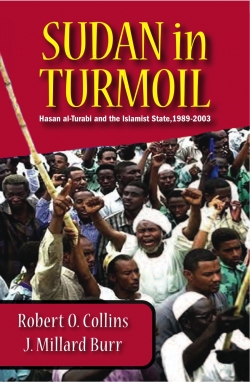 Sudan was the first Islamist nation created within the larger Sunni community. The authors specifically focus on the activity of Sudanese intellectual Hasan al-Turabi, the eminence gris of the Sudanese Islamist movement and its political guide (murshid). Turabi, a prominent legal scholar and Muslim Brother, whose name is known and whose Islamist works are read throughout the Muslim world, was advisor to the Sudanese military cabal that seized power in June 1989. Likewise, he was advisor to a circle of young Islamists who joined the putschists and provided the managerial base required to administer the Islamist movement itself.
Sudan was the first Islamist nation created within the larger Sunni community. The authors specifically focus on the activity of Sudanese intellectual Hasan al-Turabi, the eminence gris of the Sudanese Islamist movement and its political guide (murshid). Turabi, a prominent legal scholar and Muslim Brother, whose name is known and whose Islamist works are read throughout the Muslim world, was advisor to the Sudanese military cabal that seized power in June 1989. Likewise, he was advisor to a circle of young Islamists who joined the putschists and provided the managerial base required to administer the Islamist movement itself.
Despite the fissiparous tendencies found in a multiethnic and multireligious state, and the existence of a terrible civil war that pitted the Arab North against the African South, the military leadership and its civilian allies were still determined to create an Islamic Republic of Sudan. Once content to operate in the background, Turabi eventually emerged from the shadows with his creation of the Popular Arab and Islamic Conference in April 1991. Using Khartoum as a venue, the Conference served from 1991 through 1996 as a rendezvous for scores of Islamist revolutionary movements and for future terrorist leaders from Osama bin Laden to Ayman al-Zawahiri. By 1994, Turabi had eschewed his covert advisory role to the military-dominated Revolutionary Command Council and moved to assume personal control over the nation’s political activity.
Throughout the 1990s, Turabi dominated not just domestic but also foreign policy. This book encompasses developments in both spheres, including Sudanese support for terrorist movements; Sudan’s involvement in Somalia; its support for insurgencies in Bosnia and Yemen; and its coming to serve as a home for notorious individuals, such as Osama bin Laden and “Carlos the Jackal.” The book concludes with the year 2003, when President al-Bashir placed Turabi under arrest and the military reassumed control over the political life of Sudan, events that ensured the failure of Turabi’s Islamist dream.
